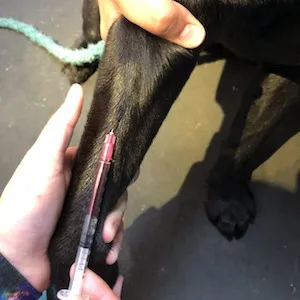Heartworms in dogs represent a serious and potentially deadly threat that every pet owner must understand. Caused by parasitic worms living in the heart, lungs, and blood vessels, this disease can lead to severe organ damage, heart failure, and even sudden death if left unchecked. As a leading cause of preventable illness in canines across the U.S. and beyond, recognizing the risks of heartworms in dogs early is crucial for maintaining your furry friend’s health and longevity.
Dogs serve as the primary natural host for these foot-long parasites, allowing them to mature, reproduce, and multiply unchecked without intervention. Even after successful treatment, the lasting impact on pulmonary arteries and cardiac function underscores why heartworm prevention for dogs remains the gold standard recommended by veterinary experts like the American Heartworm Society (AHS).
What Is Heartworm Disease?
Heartworm disease strikes dogs, cats, ferrets, and occasionally wildlife like coyotes and foxes, but dogs bear the brunt due to their susceptibility. Infected dogs can harbor hundreds of adult worms, leading to irreversible lung disease, heart enlargement, and organ failure.
 Heartworms visible in affected tissues
Heartworms visible in affected tissues
The parasites thrive in warm climates but have spread nationwide, diagnosed in all 50 states. Urban proximity to wildlife reservoirs amplifies transmission risks, making vigilance essential regardless of location.
How Heartworms Spread to Dogs
Mosquitoes are the key vectors in the heartworm life cycle. Female worms in an infected host release microfilariae into the bloodstream. A feeding mosquito ingests these larvae, which mature over 10-14 days into infective stages. When it bites your dog, the larvae enter through the wound, migrating to the heart and lungs over six months to become adults capable of living 5-7 years.
 Detailed diagram of the heartworm life cycle in pets
Detailed diagram of the heartworm life cycle in pets
Each mosquito season compounds infections, emphasizing year-round protectives. Indoor dogs aren’t immune—mosquitoes infiltrate homes, and travel exposes pets to hotspots.
Recognizing Symptoms of Heartworms in Dogs
Early heartworm infections often mimic subtle issues: mild coughing, exercise intolerance, fatigue post-activity, reduced appetite, and gradual weight loss. As worms proliferate, signs escalate to heart failure—swollen abdomen from fluid buildup—and caval syndrome, a critical blockage causing labored breathing, pale gums, and dark urine. Immediate veterinary intervention is vital; survival without surgery is rare.
Active or compromised dogs deteriorate fastest. From personal experience fostering rescues, we’ve seen vigorous Labs reduced to lethargic shadows within months, highlighting prevention’s role.
 Veterinarian examining a cat for heartworm signs, relevant to multi-pet households
Veterinarian examining a cat for heartworm signs, relevant to multi-pet households
Assessing Your Dog’s Risk for Heartworms
No area is heartworm-free. Maps from the AHS show surging incidence, fueled by climate shifts, wildlife carriers, and post-disaster pet relocations like Hurricane Katrina.
 AHS incidence map showing heartworm prevalence across the U.S.
AHS incidence map showing heartworm prevalence across the U.S.
Even northern or arid regions report cases due to overwintering mosquitoes and wind-blown vectors. The AHS “think 12” mantra—test every 12 months, prevent year-round—applies universally. For comprehensive protection, consider flea tick and parasite control for dogs, which often bundles heartworm defense.
Heartworm Testing for Dogs: When and How
Annual antigen tests via simple blood draws detect proteins from adult worms, processed in-clinic or at labs. Puppies under 7 months start preventives sans testing but get screened at 6-7 months. Adults new to prevention require pre-treatment tests.
 Veterinarian drawing blood from a dog for heartworm testing
Veterinarian drawing blood from a dog for heartworm testing
Missed doses demand retesting after 6 months, as preventives target larvae only. Vets confirm positives with follow-ups for accurate treatment planning.
Treating Heartworms in Dogs: Step-by-Step Protocol
Positive tests confirm via additional diagnostics. Stabilize first: restrict exercise strictly to curb damage acceleration, especially in symptomatic cases.
 Dog resting in a cage during heartworm recovery
Dog resting in a cage during heartworm recovery
FDA-approved melarsomine injections kill adults over 1-3 months, paired with doxycycline and preventives to minimize complications. Post-treatment testing at 9 months verifies clearance. Success rates exceed 90% for mild cases, per AHS guidelines, but older dogs or heavy burdens face higher risks. Opt for generic heartworm prevention for dogs lifelong afterward.
Prevention Strategies for Heartworms in Dogs
Monthly orals, topicals, or 6/12-month injectables eliminate pre-adult larvae. Start puppies at 8 weeks; ferrets at 2 pounds. FDA mandates prescriptions post-testing to avoid reactions in infected pets.
Many products multitask against intestinal worms, fleas, and ticks—ideal for holistic care like small dog flea and tick prevention. No vaccines or unproven naturals exist; adhere to vet-prescribed, schedule-strict regimens.
Heartworms in Cats and Ferrets: Key Differences
Cats face HARD from immature worms, with no canine treatments viable—prevention only. Ferrets, like mini-dogs, succumb rapidly to even one worm, lacking approved therapies. Indoor pets of all species need protection.
 Ferret showing signs of respiratory distress from heartworms
Ferret showing signs of respiratory distress from heartworms
Common FAQs on Heartworms in Dogs
Do preventives require prescriptions? Yes, post-testing to prevent reactions.
How do they work? Target larval stages; timing is critical to block maturation.
Safe post-expiration? No—efficacy unassured.
Missed doses? Restart immediately, retest in 6 months.
Regional risks? All states; year-round prevention safest.
Conclusion: Protect Your Dog from Heartworms Today
Heartworms in dogs devastate silently but yield to proactive prevention, testing, and prompt treatment. Consult your vet for tailored plans, embracing AHS protocols for optimal outcomes. With consistent liquid heartworm prevention for dogs, your companion thrives mosquito-season or not. Stay vigilant—your dog’s heart depends on it.
References
- American Heartworm Society: heartwormsociety.org
- FDA Guidelines on Veterinary Parasiticides
- AHS Incidence Maps (2019-2025 updates)
